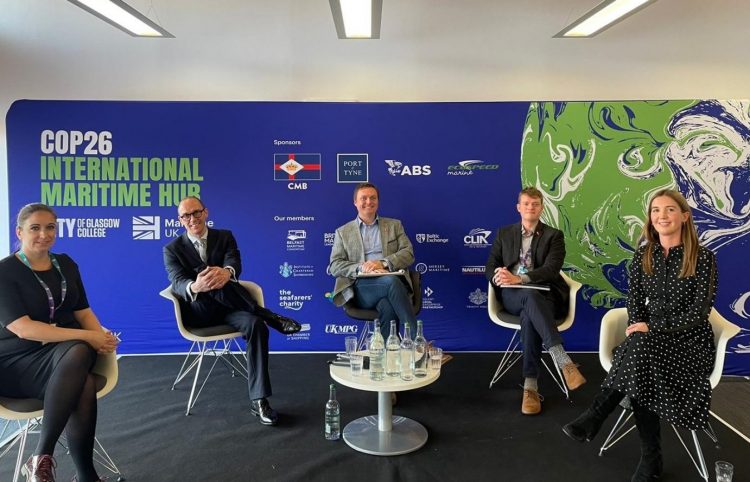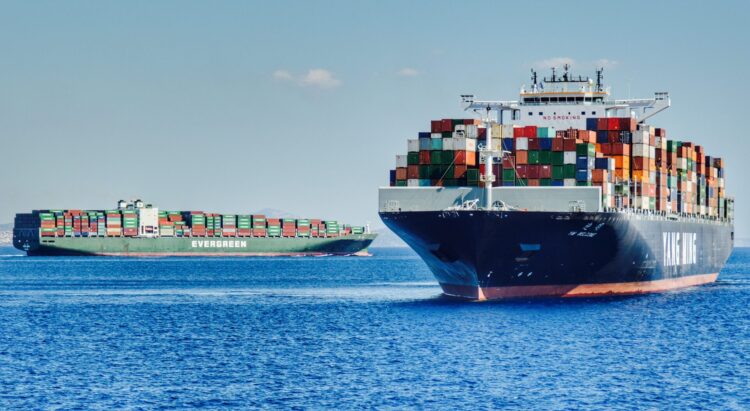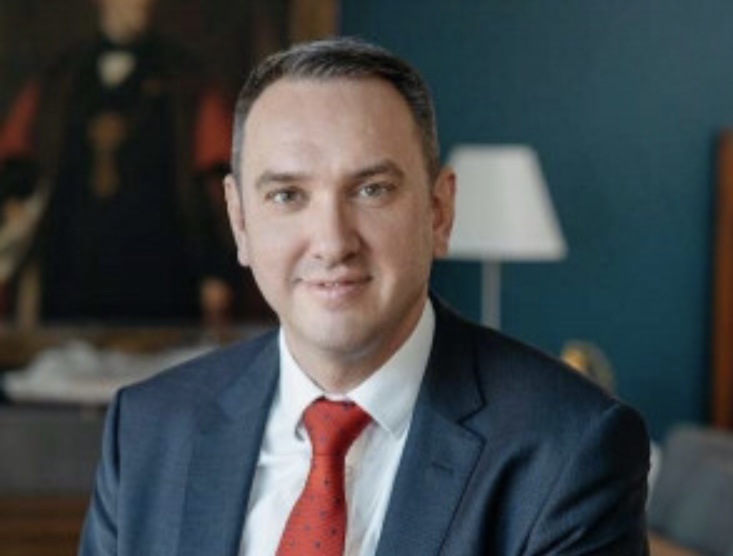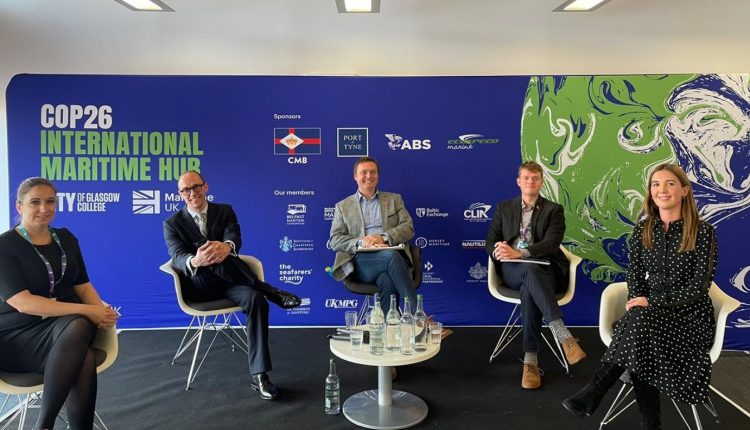Maritime sector looks to move quickly to decarbonise
At the COP26 global climate change summit in Glasgow, Mersey Maritime staged its own event and industry leaders outlined their strategy for rapid decarbonisation. Tony McDonough reports

Transforming the maritime sector so that it can decarbonise and become more sustainable is a process that has to start right now with both big and small changes.
That was one of the key messages to come out of a cornerstone event hosted by Mersey Maritime in Glasgow to coincide with the COP26 global climate change summit which saw world leaders converge on Scotland.
On the eve of COP26, Mersey Maritime chief executive Chris Shirling-Rooke had warned that businesses risked being left behind by investors if they didn’t fully embrace sustainability. He said: “A commitment to environmental, social and corporate governance is now becoming increasingly important to the world’s biggest investors. They are now looking beyond just the bottom line and the return on investment.”
Mersey Maritime organised its event in partnership with the Scottish Maritime Cluster and Maritime UK. It comprised panel discussions, chaired by Chris Shirling-Rooke, and the industry leaders taking part included:
- Nigel Quinn – CEO, Bibby Marine.
- Ben Murray – Chief Executive, Maritime UK.
- Ed Watt – maritime partner, Addleshaw Goddard.
- Kevin Hobbs – CEO, Caledonian Maritime Assets (CMAL).
- Paul Ferguson – sustainability client partner, Getronics.
- Ruth Wood – head of commercial, Mersey Maritime.
- Jodie Battson – head of partnerships, Western Union Business Solutions.
- Richard Ballantyne – CEO, British Ports Association.
Governments across the world are now committing to ambitious carbon reduction targets and the maritime sector, worth almost £50bn a year in the UK alone, is fully committed to the decarbonisation agenda. But that process is a challenging one.
It was summed up by Ed Watt from Addleshaw Goddard, who said: “It was once said to me that we don’t save the planet by buying a Tesla but by changing our behaviour – by making fewer journeys. For our industry, which operates a mode of transport that is fundamental to global international trade, this presents a significant dilemma.”
Bibby Line Group is one of Liverpool’s oldest businesses. It started off as a shipping business in 1807 and is now a diversified global business. However, maritime remains a core activity and the head of its subsidiary Bibby Marine, Nigel Quinn, outlined the businesses pioneering decarbonisation programme.
Against the backdrop of the company’s commitment to reach net zero by 2040, it has launched the Wavemaster Zero C project, in partnership with other maritime industry leaders. This aims to “aims to analyse and determine which alternative fuel is best suited to the next generation service operation vessels”.
“Wavemaster 2 will be one of the most advanced vessels ever designed,” he said. “Marine fuel being turned off in a few years is creating a lot of uncertainty. Our Wavemaster 2 project is a hell of a lot of work.”
Nigel was honest about the scale of the challenge faced by Bibby, and the entire maritime sector. He explained: “It is actually really difficult to be sustainable. Bibby is a family-owned business and we are trying to be good citizens.
“Our maritime business is 215 years old. When it was founded Napoleon was running around Europe and there were fewer than 1bn people on the planet. Now that has risen to 7bn and it is projected to reach 10bn in a few years – if we want to be sustainable then we are running out of time.”
The Wavemaster 2 project, he said, had been a model of collaboration between industry, Government and universities. He added: “12 months ago we would have built a carbon vessel. Our next vessel will be low carbon and the one after that will be zero carbon.
“Nothing is ever easy but we have found that if you have the right people in the room then magic can happen.”
Ruth Wood from Mersey Maritime said that one of Mersey Maritime’s key roles was to bring people together and to help smaller businesses, who may feel daunted by the scale of change, become part of the wider transformation.
“We are a regional cluster organisation,” she said. “Our whole purpose is about being a catalyst for growth and helping to create jobs, as well as influencing policy. We are helping to drive change for the good of the sector and our communities and create a sustainable future.
“From my perspective we are looking to help the small companies and organisations by directing them to where they may be able to get more support. It isn’t just about the big transformational changes. There are many small things we can all do. Small steps are important as well as the bigger projects and collaboration is key to this.”
Ruth also talked about how diverse the sector was and how it was Mersey Maritime’s role to support the “eco-system”. She added: “It is about asking how we bring everyone in the wider supply chain to work together to achieve our goals.
“We have shipping lines, ports, freight forwarders, professional services and we have held a series of forums to bring people together. As a result of those events there have been a number of new projects that have started. We see ourselves as the conduit and we join the dots.”
Although all of the speakers emphasised the scale of the journey ahead when it comes to sustainability, Richard Ballantyne of the British Ports Association (BPA) talked about how far we had come over the past few years.
“When I first joined the industry 15 years ago we had the Carbon Trust,” he said. “They were set up to help companies become greener. They would come into your business and they would carry out a carbon audit.
“They would make suggestions such as turning lights out when they weren’t being used or installing LED lighting. When they were done you would get a little green sticker. We have moved on significantly from that and we are now doing so much more.


“We are now actively helping government to deliver its sustainability targets through things such as thorough facilities for the installation and maintenance of offshore renewable facilities and by helping move around 90% of goods around the world.
“Our ports are where they are and cannot move so we have to work with what and where we are now. We will have to make some difficult decisions. The BPA has produced a number of case studies of environmental best practice which you can see on our website.”
Richard added that if the Government was serious about reaching its net zero targets then it needed to work with ports, and the maritime sector, and invest in the necessary infrastructure such as shore power to enable ships to “plug in”.
He explained: “We have looked around the world and there are very few examples of shore power infrastructure being installed without some form of public subsidy. The Government needs to look at how it can stimulate things with support for R&D but in ways that will not skew competition.”
Ben Murray from Maritime UK said the Chancellor had indicated up to £300m may be available for projects when he delivered his Autumn Budget but said it was the responsibility of the maritime sector to be creative and come forward with viable projects in order to grab a slice of that money.
However, he also pointed out how the environmental, social and governance (ESG) agenda went far beyond decarbonisation. Diversity, he said, was also a critical part of how companies operated now and in the future. And this needs to be reflected at all levels of businesses, from the shop floor to the boardroom.
“In terms of the ESG agenda, firms need to think about how they are going to put their own diversity plans into place,” said Ben. Morally, it is the right thing to do. People need to be allowed to be who they are. They have to feel that the maritime sector is for them.
“I want wider society to be able to engage with our sector. And there is also the value and benefit we get from having people with different lived experiences around the table. It offers us a breadth of ideas and different solutions.
“There is a compliance imperative and an unquestionable economic value in having a diverse workforce. And if you don’t have that then you may find yourself locked out of various streams of funding… to need to get ahead of the curve.”

